|
It is one of the most entrenched visions in the rock critic's vocabulary;
Nico as doomed valkyrie, droning death-like through a harsh gothic monotone,
a drained beauty pumping dirges from her harmonium while a voice as old
as dirt hangs cobwebs round the chords. In fact she only made one album
which remotely fit that bill -- this one -- and it's a symbol of its significance
that even the cliché emerges as a thing of stunning beauty. Her
first album following three years of rumor and speculation, The End was
consciously designed to highlight the Nico of already pertinent myth.
Stark, dark, bare, and frightening, the harmonium dominant even amid the
splendor of Eno's synthesized menace, John Cale's childlike piano, and
Phil Manzanera's scratchy, effects-whipped guitar, it is the howling wind
upon wuthering heights, deathless secrets in airless dungeons, ancient
mysteries in the guise of modern icons. Live, Nico took to dedicating
the final cut, a sparse but heartstoppingly beautiful interpretation of
the former German national anthem, to terrorist Andreas Baader, even as
the song itself conjured demons of its own from an impressionable Anglo-American
audience. Nico later admitted she intended the performance in the same
spirit as Jimi Hendrix rendered "Star Spangled Banner." But
"Das Lied der Deutschen" -- "Deutschland Uber Alles"
-- has connotations which neither tribute nor parody could ever undermine.
It is only in the '90s that even Germany has reclaimed the anthem for
its own. In 1974, it was positively leperous. Listen without prejudice,
though, and you catch Nico's meaning regardless, even as her voice tiptoes
on the edge of childlike, all but duetting with the little girl she once
was, on a song which she'd been singing since the cradle. The ghosts pack
in. Former lover Jim Morrison haunts the stately "You Forgot to Answer,"
a song written about the last time Nico saw him, in a hired limousine
on the day of his death; of course he reappears in the title track, an
epic recounting of the Doors' own "The End," but blacker than
even they envisioned it, an echoing maze of torchlit corridors and spectral
children, and so intense that, by the time Nico reaches the "mother...father"
passage, she is too weary even to scream. The cracked groan which emerges
instead is all the more chilling for its understatement, and the musicians
were as affected as the listener. The mutant funk coda with which the
performance concludes is more than an incongruous bridge. It is the sound
of the universe cracking under the pressure. But to dwell on the fear
is to overlook the beauty -- The End, first and foremost, is an album
of intimate simplicity and deceptive depths. Nico's voice stuns, soaring
and swooping into unimagined corners. No less than "Das Lied der
Deutschen," both "Valley of the Kings" and "It Has
Not Taken Long" make a mockery of the lazy critical complaints that
she simply grumbled along in a one-note wail, while the arrangements (most
of which were Nico's own; producer Cale admits he spent most of his time
in the studio simply marveling) utterly rerout even the most generous
interpretation of what "rock music" should sound like. The End
doesn't simply subvert categorization. It defies time itself.
(Dave Thompson, All
Music Guide)
|
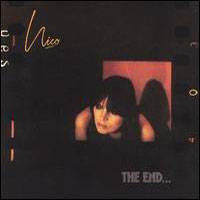
 Plattentipp
Plattentipp 



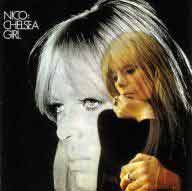

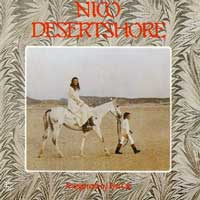


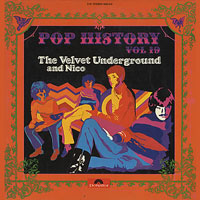
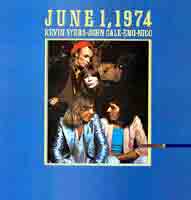

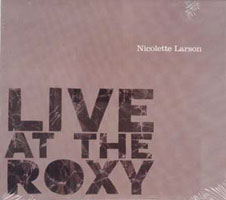

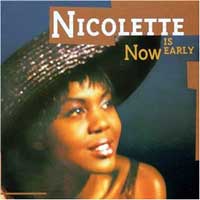
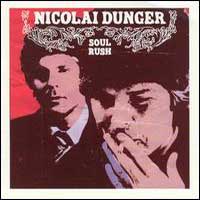
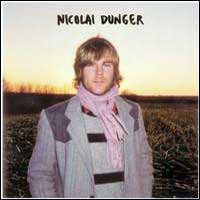
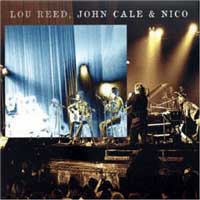

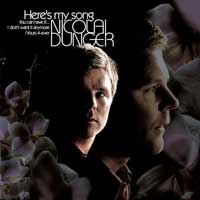

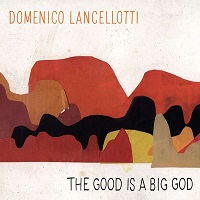
 ein unentdeckter Klassiker der 70er! (Musikexpress, August 2016)
ein unentdeckter Klassiker der 70er! (Musikexpress, August 2016)  Velvet Underground-Nebenprojekt
Velvet Underground-Nebenprojekt 